Serums is one of the most important steps in a skincare routine in my opinion. It’s like the main course of a meal where your skin will get most of its nutrients, so it’s important that we choose products that fit our skin’s needs and use them correctly.
Saying that there are thousands of serum options out there might be an understatement, and with so many options to pick from and each claiming that they solve every skincare concern under the sun, what is a girl (or boy) to do? Which serum do we pick? How many do we really need in our routine? When and how should we use them?
There are very few cure-all serums out there, and depending on the ingredients they feature, will generally be an antioxidant, hydrating, anti-aging, brightening, or exfoliating serum. Each type caters to specific skincare needs and varies in when and how to use them, so let’s take a closer look at each one:
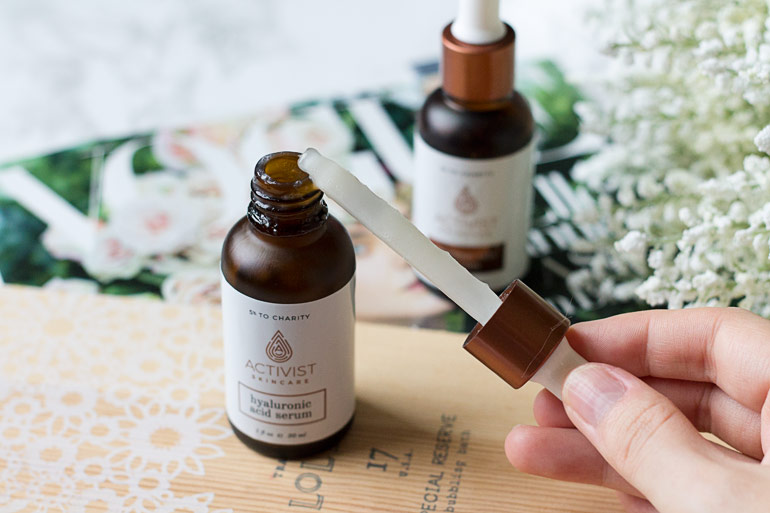
Antioxidant serums
- What they do
- Protect your skin from free radicals (UV rays, pollution, etc), which can accelerate the skin’s aging process. Many antioxidants also provide other benefits like increasing collagen production or soothing irritations.
- Common ingredients
- vitamin c, vitamin e, niacinamide, green tea extract, coQ10, grape seed extract, resveratrol, ferulic acid
- When to use them
- In the mornings to protect your skin throughout the day. Can also be used at night.
If there’s one serum worth investing in, it’s an one packed with antioxidants because they typically provide a variety of benefits for the skin.
Think of them as the Jack of All Trades, though if you’re looking for specific goals like anti-aging or brightening, an antioxidant serum alone might not be enough. However most do include a couple hydrating ingredients, so unless your skin is parched, an antioxidant serum can double as a hydrating serum.
Since their main purpose is to protect the skin, make sure you have one in your morning routine so your skin is safe from the external (or internal) free radicals. Of course, don’t forget sunscreen!
Antioxidant serums to try
- Activist Skincare Custom Hyaluronic Acid Serum* – In addition to the standard formula of antioxidant blends, custom ingredients are added to address your skincare concerns. (full review)
- Skin Actives Collagen Serum – An excellent mix of well-researched antioxidants that delivers results despite it’s blah packaging and texture. (full review)
- Innisfree Green Tea Seed Serum – Such a beautiful texture, this one is affordable and helps subsequent products work better!
- Holifrog Galilee Antioxidant Dewy Drops* – A milky blend of powerful antioxidants like niacinamide and CoQ10 that protects and nourishes at the same time!
Of course we can’t forget one of the best antioxidants to include in our routine! 7 types of Vitamin C compared: which one is right for your skin?
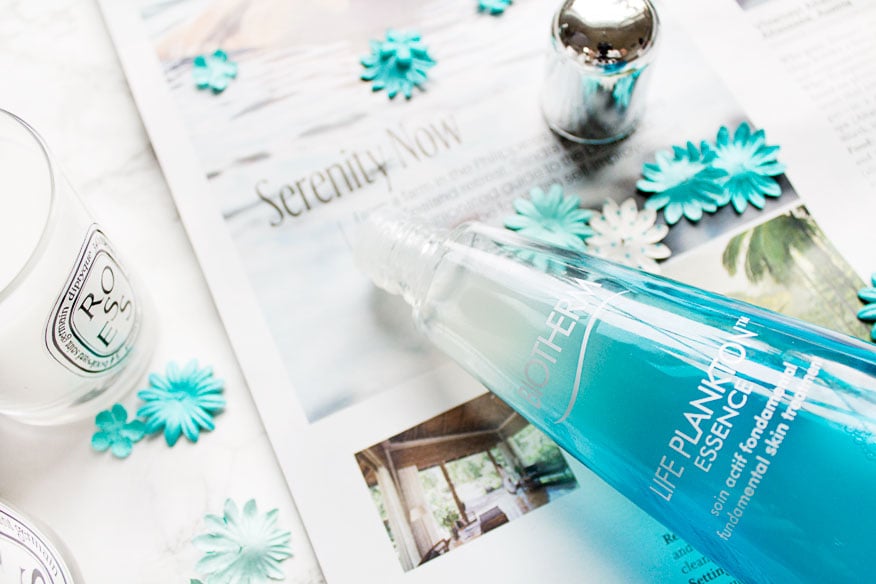
Hydrating Serums
- What they do
- Draw and help retain moisture on your skin to keep it soft and supple.
- Common ingredients
- Humectants – hyaluronic acid, glycerin, collagen, trehalose, sodium PCA, panthenol, honey, aloe vera, urea
Emollients – ceramides, cholesterol, silicones, squalane, and most oils - When to use them
- Mornings and evenings, after the rest of your serums and before your moisturizer.
Most hydrating serums are a mix of humectants (drawing moisture to the skin) and emollients (helps retain moisture by filling any holes in our skin’s natural barrier), though often times they will also include antioxidants for extra benefits.
Since these moisturizing ingredients work close to the skin’s surface, make sure to use your other serums first so they have a chance to reach into the deeper layers of your skin.
If you’re still young and have healthy skin, a hydrating serum is really all you need to keep your skin in great shape. Hydrating serums are also excellent if you have sensitive or irritated skin. The ingredients are typically gentle, and some are even anti-inflammatory and will help with the redness.
Hydrating serums to try
- May Coop Raw Sauce* – A toner/essence/serum hybrid. A favorite of mine that is incredibly hydrating with minimal stickiness.
- The Ordinary Marine Hyaluronics – Super affordable and lightweight, this is an excellent option for oily skin folks.
- Klairs Rich Moist Soothing Serum – This reminds me a lot of my favorite Supple Preparation Toner, but with even more hydrating ingredients to moisturize and soothe the skin.
- Tunemakers Ceramide 200 – A simple essence with ceramides to help improve your skin’s natural moisture retention abilities. (full review)
- Biotherm Life Plankton Essence – A silky essence that deeply hydrates the skin, leaving it soft and smooth. (full review)
Skincare Tip
If you don’t want to invest in a hydrating serum, use a hydrating sheet mask instead! Apply one after your other serums to enhance penetration of previous ingredients and give your skin a big drink of water!
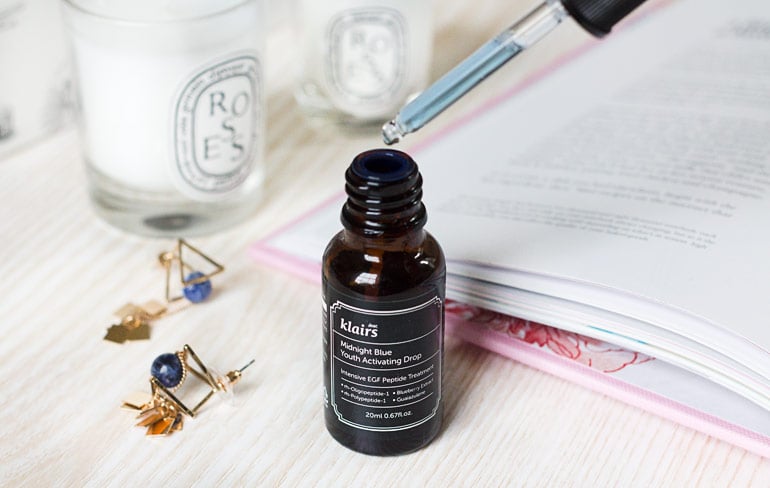
Anti-aging serums
- What they do
- Minimize the appearances of fine lines and wrinkles, restore skin firmness and elasticity through increased collagen production
- Common ingredients
- niacinamide, peptides (look for names ending in -peptide), egf, retinoids (tretinoin, retinol, retinal)
- When to use them
- In the evening, unless your serum doesn’t contain any vitamin a derivatives, then you can use it during the day too.
After the age of 25, our collagen production starts going downhill, so it doesn’t hurt to start using anti-aging serum in your early 20’s.
While peptides are gentle and can be found in a variety of serums, the anti-aging gold standard is tretinoin, the most potent (and irritating) form of vitamin a. There are also gentler forms like retinol and retinal that require multiple conversion processes before it can be used by the skin, but some of the efficacy is lost during each conversion step, so keep that in mind.
Read more: How to use retinol without irritations: a beginner’s guide
If you’re in your early/mid 20’s, niacinamide, peptides, retinol, or even retinyl palmitate will suffice, but once you get older you’ll definitely want to look at adding tretinoin to your routine.
Anti-aging serums to try
- Curology – A custom formula prescribed by a board-certified health profession to address your skincare concerns. Two of the key ingredients in my formula? Tretinoin + niacinamide. This is a staple in my routine.
- Inkey List Retinol Serum* – A super gentle and affordable option that’s great for retinoid beginners! (full review)
- Maelove Moonlight Retinal Super Serum* – Beautifully formulated and uses the slightly stronger but still gentle retinal. A great next step up from your beginner retinoid.
- Verso Super Serum – Includes the newer retinyl retinoate that’s gentle yet 8x more effective than retinol. My skin was radiant after using this for 2 weeks!
- Oskia Super 16 Serum – A beautiful serum with antiaging and antioxidant benefits. I saw overall skin health improvements while using this.
- Klairs Midnight Blue Youth Activating Drops – A water-like essence with growth factor peptides and calming guaiazulene that’s really improved the texture of my skin. I’m on my 3rd bottle. (full review)
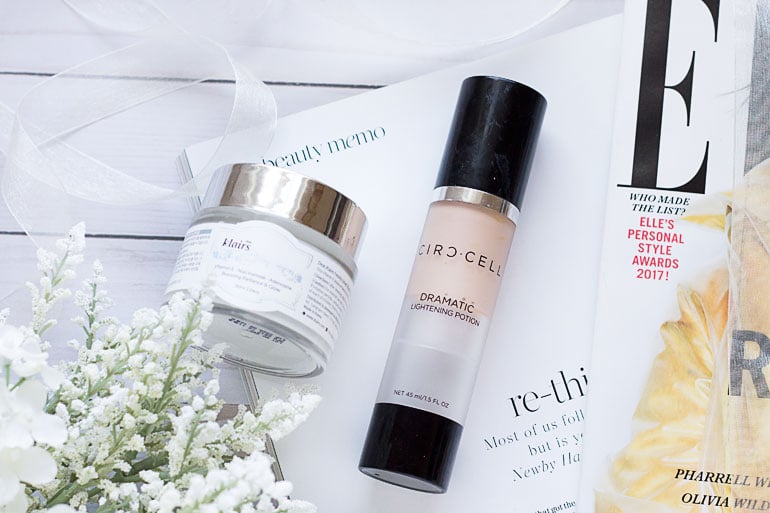
Brightening Serums
- What they do
- Improve skin tone and clarity by preventing discoloration and dullness
- Common ingredients
- niacinamide (truly a triple threat), vitamin c, hydroquinone, kojic acid, arbutin, tranexamic acid, licorice root extract, azelaic acid, retinoids
- When to use them
- Preferably in the evening, unless your serum doesn’t contain any hydroquinone, arbutin (which hydroquinone is derived from), or vitamin a derivatives, then you can use it during the day too.
Contrary to what you might think, most brightening serums actually don’t brighten your skin by getting rid of discoloration, but by preventing it from forming in the first place.
A lot of factors can trigger pigmentation to form (eg. inflammations, UV rays, hormones), and these brightening ingredients swoop in to stop the process so these dark spots never see the light of day.
If you have existing dullness and discoloration you’d like to address asap, it’s best to pair brightening serums with an exfoliating serum to get the best results. Of course don’t forget sunscreen!
Brightening serums to try
- SK-II GenOptics Aura Essence Serum – Expensive, but it’s also gentle enough to use twice a day. After a few weeks my skin was noticeably brighter and had a radiant glow to it!
- Neogen Real Ferment Micro Serum – An affordable dupe to the SK-II Genoptics above, it delivers incredible brightening results and hydrates too! (full review)
- Lixirskin Vitamin C Paste – One of the few vitamin c products that deliver brightening results, can also be used as a mask!
- Inkey List Vitamin C 30%* – Strong but affordable and noticeably brightens the skin! Mix with a hydrating serum to dilute! (full review)
- Curology – I’m cheating by listing this twice, but it does include 4% azelaic acid + 5% niacinamide for keeping dark spots at bay.
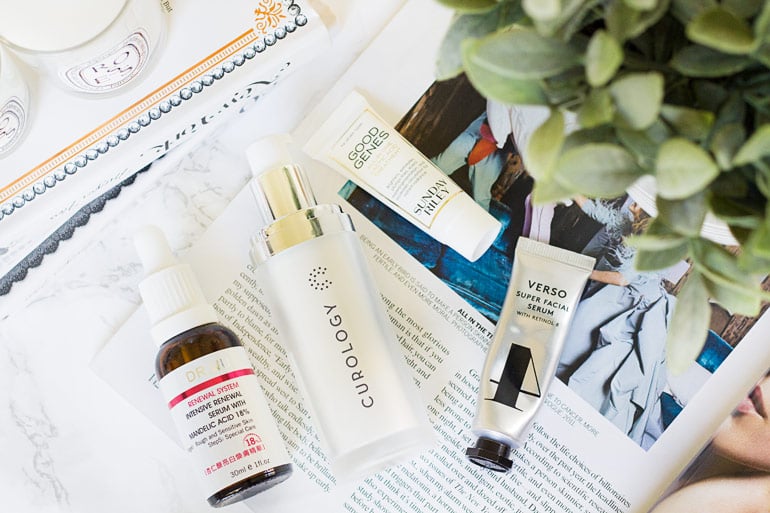
Exfoliating Serums
- What they do
- Improve skin cell turnover to reveal smoother, clearer, and more radiant skin.
- Common ingredients
- AHAs (glycolic acid, lactic acid, mandelic acid, citric acid, tartaric acid), BHAs (salicylic acid, betaine salicylate), and PHAs (lactobionic acid, gluconic acid/gluconolactone)
- When to use them
- In the evening as the first step after cleansing (AHAs and BHAs require a lower pH level for maximum efficacy)
If you want to improve your skin tone and texture, look for AHAs like glycolic, lactic, or the gentler mandelic acid (my favorite).
If you have acne-prone or congested skin, salicylic acid will help unclog your pores. PHAs like lactobionic and gluconic acids are even gentler than mandelic acid, making them suitable for those who can’t stand AHAs or BHAs.
Further reading: The AHA moment: 13 exfoliant for baby smooth skin
No matter which option you go with, exfoliating serums can deliver quick results, but it’s important that you start slow and give your skin time to adjust to the acids. Overexfoliating can happen before you know it, especially if you’re also using vitamin c (ascorbic acid) or retinoids (particularly tretinoin) in your routine.
Exfoliating serums to try
- Dr. Wu’s Intensive Renewal Serum 18% – Forever my HG exfoliating serum, this one is super gentle and leaves me with smoother skin without irritations.
- Cosrx BHA Blackhead Power Liquid – This is more like an essence, but it’s super gentle and helps keep my pores clear.
- Kiehl’s Ferulic Brew Antioxidant Facial Treatment* – Uses the slightly gentler lactic acid and includes nourishing ingredients to buffer any irritations, this one is gentle enough for daily use!
- Sunday Riley Good Genes – Also lactic acid based but stronger and delivers more noticeable results!
- HoliFrog Halo AHA BHA Evening Serum* A stronger exfoliating serum that will work on the surface level and in the pores. A little goes a long way with this!
I haven’t tried too many exfoliating serums, as I personally prefer gentle and minimal exfoliation only when necessary. But I know many people swear by an exfoliating serum and when used appropriately, they can really make a huge difference to your skin!
How to match your serums
As much as we’d all like to use all these serums in our routine everyday, for most of us that just not feasible (both for the skin and wallet). Here are some ideas on how you can mix and match these serums:
Healthy skin with with a focus on prevention:
Morning → antioxidant serum + optional hydrating serum
Evening → anti-aging serum + optional hydrating serum OR weekly exfoliating serum + anti-aging serum
Dull and textured skin
Morning → antioxidant serum + non-retinol/hydroquinone brightening serum
Evening→ exfoliating serum + brightening serum
Mature skin wanting to minimize signs of aging (my current mix!)
Morning → antioxidant serum + non-retinol anti-aging serum
Evening → weekly exfoliating serum + anti-aging serum OR anti-aging serum + brightening serum
Acne-prone and congested skin
Morning → antioxidant serum + hydrating serum
Evening → exfoliating serum + hydrating serum OR brightening serum (to help with acne scarring) + hydrating serum
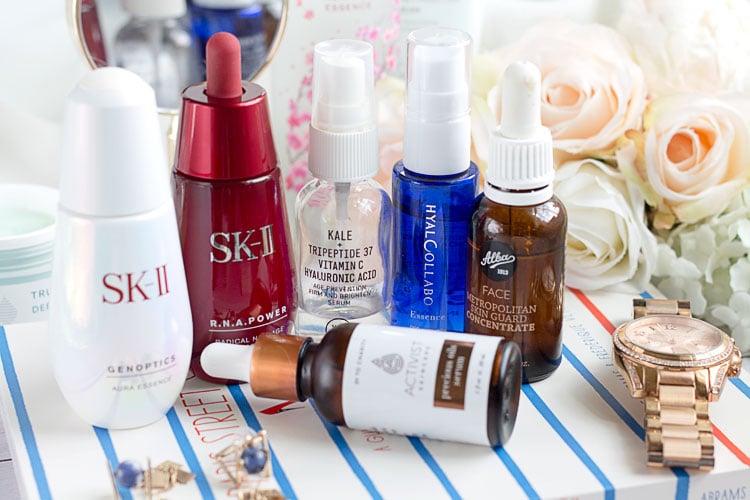
Though I’ve tried to categorize the serums into 5 types, the truth is that many serums today will be a hybrid of multiple types. So it’s still important that you check the ingredient labels to make sure you’re not using something with sensitizing ingredients during the day, or layering on multiple serums with acids that can potentially irritate the skin. When in doubt, follow the product instructions and “less is more” rule!
Hope you found this post helpful, and let me know which serums you use and swear by! Have a great week everyone!


Wow, thank you for this detailed and awesome post! I was just thinking that my serum isn’t sufficient though seems to be so good, so far (Drunk Elephant night serum). My skin is similar to yours and I really need to hit it with some anti-aging and antioxidant serums! You are enabling to spend too much (though necessary) money on Oskia super super 16 serum and the Verso serum.
I have also been debating getting and LED light though. Hmm worth it? I would also love it if it means I use serum less often!
I’m obsessed with everything skincare so I really enjoyed reading this post. I love the hydrating serums, but after reading this I realised there are so many cool serums out there to try! I’m literally bookmarking this post because of how useful it is, thank you!
xx
http://www.stylebydeb.com
Giiirll this is literally the most user-friendly, informative post that I have ever seen! Thanks so much for putting in so much work to share it with us. :) I absolutely love face serums, and can’t imagine my skincare routine without them. I’ve tried a lot of different ones, but lately I have been loving the Chobs Centella Asiatica serum. My skin is oily and acne-prone, and this is the only serum that’s actually made a visible difference! xoxo
Kay
http://shoesandglitter.com
I love applying serum especially in my night skincare routine. They are really helpful.
You are looking so pretty in black dear.
Have a nice day.
Kisses <3
http://www.rakhshanda-chamberofbeauty.com/
Your words on antioxidant serums have certainly inspired me, particularly your point on how they’re worth spending a little more on! I’m fairly new to the world of serums, but I’m becoming increasingly interested – that’s for sure! :)
aglassofice.com x
LOVE this article! You always have so great and informative posts. I also spotted some of my good old serum friends, but also a bunch of serums that will go on my wishlist. Thank you so much!
This post is honestly so informative! Thank you thank you thank you! I am bookmarking this because serums always sound so great but I never know what is actually best for my skin!
Such an information and thorough post Jenny! This so help to me as the world of serums can be a bit overwhelming at times. so many I want to try, will be bookmarking this to come back too. xx
A very helpful post, thank you Jenny. I love that you took the time to propose different pairings for different concerns, very helpful.
Anne|Linda, Libra, Loca
Terrific breakdown Jenny! Whenever anyone asks me for skincare advice, I almost always tell them to add a serum to target their specific skin concerns. If only there were a a cure all serum. I wish. I always rotate a few depending on what’s going on with my skin. The Oskia Super 16 is one of my favorites. I just tried a deluxe sample of the SK-II GenOptics Aura Essence Serum and I was impressed enough that I will probably be purchasing it soon :)
Thanks for laying out Serums. I’m trying to learn more about skincare and this post really helped.
Jennifer | Mrs Q Beauty
Before I started blogging about skincare, I thought serums aren’t necessary. But now, I can’t live without it. My day isn’t complete without using my fave serum XD
xx Alyssa | STYLE VANITY